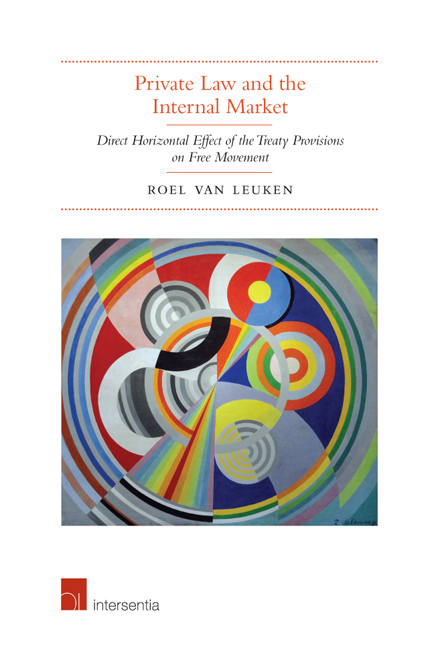 Private Law and the Internal Market
Private Law and the Internal Market Book contents
- Frontmatter
- Preface
- Contents
- Table of Cases
- List of Abbreviations
- Chapter 1 Introduction
- Part I Direct Horizontal Effect: Concept and Application in Competition Law
- Chapter 2 Direct and Indirect Effects of the TFEU on Legal Relationships between Individuals
- Chapter 3 Direct Horizontal Effect of Articles 101(1) and 102 TFEU: Private Law Consequences
- Part II Direct Horizontal Effect: Internal Market
- Part III Justifications
- Bibliography
- Index
Chapter 3 - Direct Horizontal Effect of Articles 101(1) and 102 TFEU: Private Law Consequences
from Part I - Direct Horizontal Effect: Concept and Application in Competition Law
Published online by Cambridge University Press: 27 September 2018
- Frontmatter
- Preface
- Contents
- Table of Cases
- List of Abbreviations
- Chapter 1 Introduction
- Part I Direct Horizontal Effect: Concept and Application in Competition Law
- Chapter 2 Direct and Indirect Effects of the TFEU on Legal Relationships between Individuals
- Chapter 3 Direct Horizontal Effect of Articles 101(1) and 102 TFEU: Private Law Consequences
- Part II Direct Horizontal Effect: Internal Market
- Part III Justifications
- Bibliography
- Index
Summary
INTRODUCTION
The prohibition of anti-competitive agreements (Article 101(1) TFEU) and the prohibition of abuse of dominance (Article 102 TFEU) can be invoked by individuals against undertakings whose conduct violates these prohibitions (see paragraph 15). The consequences which the so-called direct horizontal effect of these Treaty provisions has for private law relationships are varied. This chapter will successively discuss the nullity of legal acts that are contrary to Article 101 or 102 TFEU (section 3.2.), liability for wrongful act arising from infringement of the prohibition of anti-competitive agreements (section 3.3.), and actions for undue payment (section 3.4.) and unjust enrichment (section 3.5.) that are based on violation of the same prohibition.
NULLITY OF LEGAL ACTS
Article 101(1) TFEU prohibits ‘all agreements between undertakings … which may affect trade between Member States and which have as their object or effect the prevention, restriction or distortion of competition within the internal market.’ Article 101(2) TFEU provides that agreements affected by the prohibition are null and void by operation of law. The case law of the Court of Justice shows that such nullity is absolute, and that the national courts must establish the nullity of their own motion. Furthermore, the Court has specified the meaning of this nullity sanction by ruling that it only applies to the parts of the agreement that are affected by the prohibition of Article 101(1) TFEU. If these parts are non-severable from the other parts of the agreement, the entire agreement is null and void; if they are severable, then the consequences for the other parts of the agreement are determined in accordance with the national law.
From the above it can be inferred that it is EU law (and therefore ultimately the Court of Justice) which determines to what extent national private law applies to the legal consequences of the nullity of the agreement struck by Article 101(1) TFEU. In view of the purport of this Treaty prohibition, it is plausible to assume that the Court considers the element of prevention so important that it will not easily find modification or mitigation of the nullity permissible.
The consequences of nullity for other agreements (between the same parties or with third parties) are governed by national private law.
- Type
- Chapter
- Information
- Private Law and the Internal MarketDirect Horizontal Effect of the Treaty Provisions on Free Movement, pp. 27 - 36Publisher: IntersentiaPrint publication year: 2017


